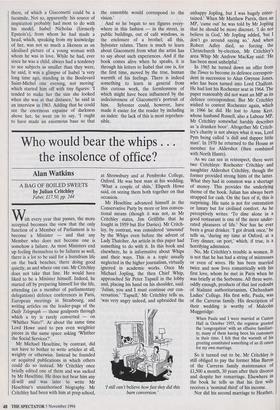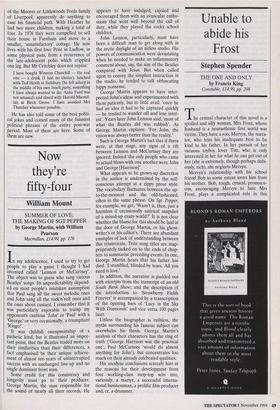Who would bear the whips . . .
the insolence of office?
Alan Watkins
A BAG OF BOILED SWEETS by Julian Critchley Faber, f17.50, pp. 244 With every year that passes, the more accepted becomes the view that the only function of a Member of Parliament is to become a Minister — and that any Member who does not become one is somehow a failure. As most Ministers end up feeling themselves to be failures as well, there is a lot to be said for a humdrum life on the back benches, there doing good quietly, as and where one can. Mr Critchley does not take that line. He would have liked to be a Minister himself. Indeed, he started off by preparing himself for the life, attending (as a member of parliamentary delegations) defence conferences in Paris, European meetings in Strasbourg, and writing articles on the leader-page of the Daily Telegraph — those goalposts through which a try is rarely converted — on `Whither Nato?'. At about the same time Lord Howe used to pen even weightier pieces in the same space asking 'Whither the Social Services?'.
Mr Michael Heseltine, by contrast, did not have to bother to write articles at all, weighty or otherwise. Instead he founded or acquired publications in which others could do so instead. Mr Critchley once briefly edited one of them and was sacked by Mr Heseltine. He does not bear him any ill-will and was later to write Mr Heseltine's unauthorised biography. Mr Critchley had been with him at prep school, at Shrewsbury and at Pembroke College, Oxford. He was best man at 'his wedding. `What a couple of shits,' Elspeth Howe said, on seeing them both together on that occasion.
Mr Heseltine advanced himself in the Conservative Party by more or less conven- tional means (though it was not, as Mr Critchley states, Jim Griffiths that he fought in 1959 but Ifor Davies). Mr Critch- ley, by contrast, was considered 'unsound' by the Whips even before the advent of Lady Thatcher. An article in this paper had something to do with it. In this book and elsewhere, he is informative about Whips and their ways. This is a topic usually neglected in the higher journalism, virtually ignored in academic works. Once Mr Michael Jopling, the then Chief Whip, approached Sir Peter Tapsell in the lobby and, placing his hand on his shoulder, said: `Julian, you and I must continue our con- versation.' Tapsell,' Mr Critchley tells us, `was very angry indeed, and upbraided the `I still can't believe how fast they did this barn conversion.' unhappy Jopling, but I was hugely enter- tained.' When Mr Matthew Pan-is, then an MP, 'came out' he was told by Mr Jopling that he should be more discreet. do not believe in God,' Mr Jopling added, 'but I don't go around saying so.' And when Robert Adley died, so forcing the Christchurch by-election, Mr Critchley's area Whip Mr Andrew MacKay said: 'He has been most unhelpful.'
In 1965 he turned down an offer from the Times to become its defence correspon- dent in succession to Alun Gwynne Jones, who has been turned into Lord Chalfont. He had lost his Rochester seat in 1964. The paper reasonably did not want an MP as its defence correspondent. But Mr Critchley wished to contest Rochester again, which in 1966 he did. He lost to Anne Kerr, whose husband Russell, also a Labour MP, Mr Critchley somewhat harshly describes as 'a drunken boor'. Altogether Mr Critch- ley's charity is not always what it was, Lord Pym being called 'a dull and dapper little man'. In 1970 he returned to the House as member for Aldershot (then combined with North Hants).
As we can see in retrospect, there were two Critchleys: Rochester Critchley and naughtier Aldershot Critchley, though the former provided strong hints of the latter. What they had in common was a shortage of money. This provides the underlying theme of the book. Julian has always been strapped for cash. On the face of it, this is surprising. His taste is not for ostentation or luxury but for civilised comfort. As he perceptively writes: `To dine alone in a good restaurant is one of the more under- rated pleasures of life.' Nor has he ever been a great drinker. 'I got drunk once,' he tells us, 'during my time at Oxford, at a Tory dinner, on port,' which, if true, is a horrifying admission.
No, Mr Critchley's trouble is women. It is not that he has had a string of mistresses or even of wives. He has been married twice and now lives romantically with his first love, whom he met in Paris when he was briefly at the Sorbonne. All three were, oddly enough, products of that last redoubt of Stalinist authoritarianism, Cheltenham Ladies' College. His first wife, Paula, was of the Can-eras family. His description of their wedding is worthy of Malcolm Muggeridge:
When Paula and I were married at Caxton Hall in October 1955, the registrar greeted the 'congregation' with an effusive familiari- ty; many of them having been his customers in their time. I felt that the warmth of his greeting constituted something of an ill omen for my own marriage.
So it turned out to be. Mr Critchley is still obliged to pay the former Miss Baron of the Cameras family maintenance of L1,500 a month, 30 years after their divorce and despite her remarriage. Elsewhere in the book he tells us that his first wife receives a 'nominal third' of his income.
Nor did his second marriage to Heather, of the Moores or Littlewoods Pools family of Liverpool, apparently do anything to ease his financial path. With Heather he had two more children, making a total of four. In 1976 they were compelled to sell their house in Farnham and move to a smaller, 'unsatisfactory' cottage. He now lives with his first love Prue in Ludlow, in some physical pain, from a recurrence of the late-adolescent polio which crippled one leg. But Mr Critchley does not repine: I have bought Winston Churchill — the real one — a drink (I had no choice), lunched with Ted Heath at Salisbury (he fell asleep in the middle of his own lunch party, something have always wanted to do; Anna Ford was not amused) and dined with Harold Macmil- lan at Birch Grove. I have avoided Mrs Thatcher whenever possible.
He has also told some of the best politi- cal jokes and coined many of the funniest political phrases of the entire post-war period. Most of them are here. Some of them are new.











































































 Previous page
Previous page